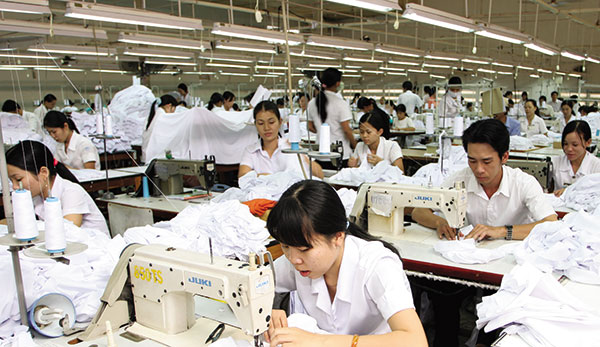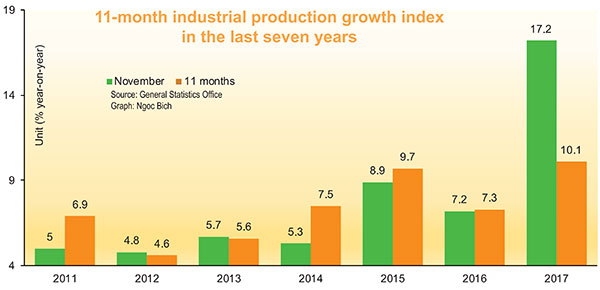Manufacture is economic propellant
 |
| The manufacturing and processing sector is a key driver in Vietnam’s economic growth Photo: Le Toan |
 |
The General Statistics Office (GSO) last week reported that in November, the manufacturing and processing sector rose by a record 24.3 per cent year-on-year, higher than the year-on-year record 22.3 per cent last month, and almost doubling the rate of 13.1 per cent last November. This sector creates 80 per cent of Vietnam’s industrial growth.
The November manufacturing and processing growth contributed to a 14.4 per cent rise in this sector’s 11-month on-year growth, and a record 17.2 per cent rise in the economy’s November industrial growth – against only 7.2 per cent in November of last year.
The record manufacturing and processing growth for November also created a 10.1 per cent rise in the country’s 11-month industrial growth, higher than a 7.7 per cent climb in last year’s corresponding period.
South Korean tech giant Samsung is expected to earn an export turnover of about $53 billion this year, accounting for more than one-fourth of Vietnam’s total export turnover.
Samsung’s contributions have also helped to drive the 11-month industrial production growth of several provinces, such as Bac Ninh (35.3 per cent) and Thai Nguyen (18.3 per cent), which are home to $8.7 billion in Samsung investment.
In another case, Do Duc Anh, sales manager of Cong Anh Garments JSC in the northern province of Hai Duong, told VIR that in this year’s first 11 months, his company’s total production value increased about 19 per cent year-on-year to about $7 million, with an export turnover climbing 22 per cent.
“We feel optimistic about our performance because we have landed some big contracts for the first half of next year,” Anh said. “We are also recruiting more workers to meet the production demand.”
Samsung and Cong Anh Garments’ bright performance has been mirrored by GSO statistics that show the electronics and textile and garment sectors – the key manufacturing and processing drivers of the economy – saw year-on-year production increases of 31.5 and 14.5 per cent, respectively, in this year’s first 11 months.
Other industrial sectors also strongly ascended in this year’s first 11 months, such as electronics and computers (31.5 per cent), steel (26.7 per cent), metal (15.4 per cent), and fertilizer (13.4 per cent).
And, according to the GSO, if mining industry production were to pull out of its steady decline, the economy’s production would increase at an even greater clip.
In this year’s first 11 months, the mining industry contracted by 7.1 per cent, causing a 1.5 per cent drop in the industrial sector’s growth.
State-run PetroVietnam reported that, for this year, its revenue will be about VND437.8 trillion ($19.4 billion), lower than the VND452.5 trillion ($20.57 billion) of last year. This factors in a $50 per barrel export price for crude oil.
The government stated that the economy is likely to reach its 6.7 per cent growth target this year, thanks to strong growth in the economy’s key sectors, including agro-forestry-fishery (up 3 per cent – a fourfold increase against 2016 to hit a record $36-37 billion in export turnover), industry and construction (up 7.17 per cent), and service (up 7.25 per cent – the highest rise since 2008).
However, if the mining sector were not to suffer its projected decrease of 5.9 per cent through the end of the year, the whole economy would surely grow 7.24 per cent, the government said.
What the stars mean:
★ Poor ★ ★ Promising ★★★ Good ★★★★ Very good ★★★★★ Exceptional
Latest News
More News
- Hermes joins Long Thanh cargo terminal development (February 04, 2026 | 15:59)
- SCG enhances production and distribution in Vietnam (February 04, 2026 | 08:00)
- UNIVACCO strengthens Asia expansion with Vietnam facility (February 03, 2026 | 08:00)
- Cai Mep Ha Port project wins approval with $1.95bn investment (February 02, 2026 | 16:17)
- Repositioning Vietnam in Asia’s manufacturing race (February 02, 2026 | 16:00)
- Manufacturing growth remains solid in early 2026 (February 02, 2026 | 15:28)
- Navigating venture capital trends across the continent (February 02, 2026 | 14:00)
- Motivations to achieve high growth (February 02, 2026 | 11:00)
- Capacity and regulations among British areas of expertise in IFCs (February 02, 2026 | 09:09)
- Transition underway in German investment across Vietnam (February 02, 2026 | 08:00)
















 Mobile Version
Mobile Version